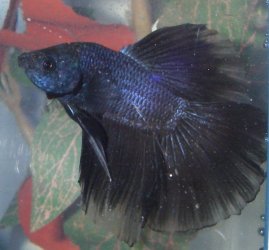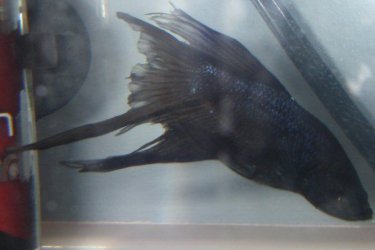jewelcolors
New Member
- Joined
- Jun 26, 2011
- Messages
- 19
- Reaction score
- 0
Over the last few days, my delta tail's fins seem to have become exceptionally fragile. He's a black lace (at best guess; he's from the LFS, and his breeding is a mystery), so it's very hard sometimes to know what's going on with him since he naturally has black fins that fade to clear at the edges.
What I'm noticing lately, though, is that where his fins used to be a nice, dark black, they're becoming transluscent and even transparent, and they seem to be falling apart at the least excuse. I'd almost say it's fin rot if I didn't see very obvious and almost uniform thinning across the whole of all of his dorsal, anal, caudal and ventral fins. He had some very extreme loss of fin in his tail, including the rays, last week, but was showing regrowth that was very rapid and now appears to have stopped or slowed. He's since lost a very large chunk of his anal fin, including the rays, but is showing some signs of regrowth there.
The water parameters in his aquarium are all good. 0 ppm ammonia, 0 ppm nitrite, and 5 ppm nitrates. My water does run on the moderately hard side. I can't tell you off the top of my head specific gH or kH and don't have a test kit for either handy right now. pH is 8.0 in the aquarium. Not ideal, but I'd rather have a steady pH than try to mess with it. The aquarium is a planted, cycled 10 gallon that's been established for about a year and a half. There's nothing in the way of decorations that would catch a betta's fins, and my DT lives on the side of the divider without a filter intake or output, so that can't be causing any fin damage, either. The current is extremely gentle. I do a 20% water change about every three weeks unless there's a pressing reason to make them more frequent. I condition the water with NovAqua Plus and AmQuel Plus, and add a half-teaspoon of aquarium salt per gallon. It's a low light setup with just a regular 15 watt flourescent bulb.
My bettas have a mixed diet of Hikari frozen bloodworms (usually about 4 good-sized bloodworms/fish) and Hikari Betta Bio-Gold pellets (3/fish), and I also alternate in Hikari frozen brine shrimp or daphnia on occasion, or a small bit of frozen pea thawed in tank water. They're fed once a day. I usually fast them one day a week, as well.
I've never had a betta with thinning fins like this before, so I'm looking for ideas of what could be going on. I'll try to get some pictures of him for you sometime today. He's been moved to an uncycled quarantine tank with essentially the same water as his regular tank, except the salt levels are 1 tsp per gallon. His neighbor on the other side of the divider in the 10 gallon shows no sign of fin damage or thinning, but he's also a much younger fish. My DT is probably about 2 years old, so I wonder if age might be a factor, although he hasn't slowed down at all. He's very active and loves to flare, which is part of the reason he's been moved somewhere he doesn't have any reflections or fish to display for. His body color is very dark, more matte black than the iridescent black-blue he used to be, but again, I wonder if this is just an effect of aging.
I am planning on picking up some new, fresher food in case what I have on hand has lost some of its nutritional value. It's about time I did anyway. If anyone has any other suggestions or theories, I'd love to hear them.
What I'm noticing lately, though, is that where his fins used to be a nice, dark black, they're becoming transluscent and even transparent, and they seem to be falling apart at the least excuse. I'd almost say it's fin rot if I didn't see very obvious and almost uniform thinning across the whole of all of his dorsal, anal, caudal and ventral fins. He had some very extreme loss of fin in his tail, including the rays, last week, but was showing regrowth that was very rapid and now appears to have stopped or slowed. He's since lost a very large chunk of his anal fin, including the rays, but is showing some signs of regrowth there.
The water parameters in his aquarium are all good. 0 ppm ammonia, 0 ppm nitrite, and 5 ppm nitrates. My water does run on the moderately hard side. I can't tell you off the top of my head specific gH or kH and don't have a test kit for either handy right now. pH is 8.0 in the aquarium. Not ideal, but I'd rather have a steady pH than try to mess with it. The aquarium is a planted, cycled 10 gallon that's been established for about a year and a half. There's nothing in the way of decorations that would catch a betta's fins, and my DT lives on the side of the divider without a filter intake or output, so that can't be causing any fin damage, either. The current is extremely gentle. I do a 20% water change about every three weeks unless there's a pressing reason to make them more frequent. I condition the water with NovAqua Plus and AmQuel Plus, and add a half-teaspoon of aquarium salt per gallon. It's a low light setup with just a regular 15 watt flourescent bulb.
My bettas have a mixed diet of Hikari frozen bloodworms (usually about 4 good-sized bloodworms/fish) and Hikari Betta Bio-Gold pellets (3/fish), and I also alternate in Hikari frozen brine shrimp or daphnia on occasion, or a small bit of frozen pea thawed in tank water. They're fed once a day. I usually fast them one day a week, as well.
I've never had a betta with thinning fins like this before, so I'm looking for ideas of what could be going on. I'll try to get some pictures of him for you sometime today. He's been moved to an uncycled quarantine tank with essentially the same water as his regular tank, except the salt levels are 1 tsp per gallon. His neighbor on the other side of the divider in the 10 gallon shows no sign of fin damage or thinning, but he's also a much younger fish. My DT is probably about 2 years old, so I wonder if age might be a factor, although he hasn't slowed down at all. He's very active and loves to flare, which is part of the reason he's been moved somewhere he doesn't have any reflections or fish to display for. His body color is very dark, more matte black than the iridescent black-blue he used to be, but again, I wonder if this is just an effect of aging.
I am planning on picking up some new, fresher food in case what I have on hand has lost some of its nutritional value. It's about time I did anyway. If anyone has any other suggestions or theories, I'd love to hear them.


